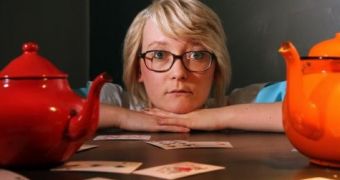The moment when Alice drinks a weird potion to go down the rabbit hole and starts feeling how everything is getting really big or really small while her body is changing is an actual human disorder called “Alice in Wonderland Syndrome” (AIWS).
Though it is really rare, this type of hallucinating episodes is actually happening to a handful of people from around the world. Abigail Moss is a 24-year-old woman suffering from AIWS who was diagnosed after the rare disease was featured in a Dr. House episode.
Abigail started researching the condition that resembled very much her childhood hallucinating crises until finally realizing that was the answer to her life-long episodes of distorted vision and perception, when objects seemed to grow or shrink around her.
The disorder was named after the famous 1865 novel by Lewis Carroll when patients accused the same symptoms Alice had after consuming the shrinking potion. This kind of disorders is really rare and the attacks can happen suddenly, lasting for about twenty minutes, according to Daily Mail.
Abigail, the real-life Alice in Wonderland, remembers the attacks being stronger when she was a child. “When I was younger, I would suffer from attacks almost every day and that was quite scary. What made it worse was that nobody knew what it was,” Ms. Moss tells Daily Mail.
Describing the attacks, the 24-year-old woman says they gradually build in strength, making one feel like the room is shrinking and their body is growing, feeling their extremities getting longer and everything has exaggerated proportions. Abigail's dad also suffered from the same condition, what makes some believe that the disorder can be hereditary.
After being miss-diagnosed for years, Moss finally diagnosed herself and started looking for other people that experienced the same symptoms. She found an entire community of AIWS patients from across the globe that shared the same frustration – that not enough research has been made in order to fully understand Alice in Wonderland Syndrome.

 14 DAY TRIAL //
14 DAY TRIAL //